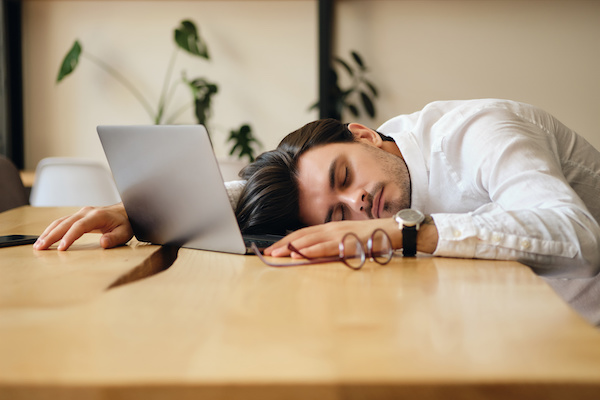
You toss and turn for what seems like hours on end. Then, when you finally settle in for a night of rest, there goes your alarm.
Research shows that around 70 million Americans struggle with sleep disorders and sleep deprivation. And for many people, this may be true even if you are getting the recommended seven to eight hours of sleep per night.
The reality is—just because you are getting enough hours of sleep—you may not be experiencing productive sleep. Without productive sleep, you may be having days of exhaustion or reaching for a few cups of coffee. When it comes to sleep, quantity doesn’t mean quality.
It’s time to jump into the ins and outs of productive and unproductive sleep.
Productive Sleep vs Unproductive Sleep
When you experience productive sleep, you have gone through multiple cycles of the sleep stages without interruption.
Unproductive sleep occurs when you wake up during any part of your sleep stages and therefore, break your sleep cycle. And, staying awake in bed and counting sheep for lengthy periods can also keep you from experiencing productive sleep as your mind will continue to work.
In addition, for productive sleep to take place, you need to experience rapid eye movement (REM) sleep, which is where your mind and body relax, helping you to feel revitalized for the following day. It is in this sleep stage that you experience dreams.
Each night, you usually enter the REM sleep stage about four times and spend a total of a couple of hours—or 25% of your sleep time. You first experience REM sleep about 90 minutes after falling asleep.
What Are the Symptoms and Causes of Unproductive Sleep?
There are many symptoms of unproductive sleep aside from merely feeling tired, and they can impact your daily life.
The symptoms can include the following:
- Moodiness
- Yawning
- Irritability
- Fatigue
- Trouble Learning and Retaining New Information
- Feeling Unmotivated
- Increased Carbohydrate Cravings and Appetite
In addition, unproductive sleep can have many causes, including medical conditions, sleeping habits, and lifestyle choices.
Here are some common reasons why people end up getting interrupted, unproductive sleep:
- Uncomfortable Bedroom Environment
- Noise Disturbances
- Physical Pain
- Jet Lag
- Restless Leg Syndrome
- Insomnia
- Depression
- Worry, Anxiety, and Stress
- Work Schedules
You may also have trouble getting productive sleep if you are exposed to blue light from your phone of T.V. before bed. Blue light disrupts your melatonin production and reduces how quickly you can fall asleep and stay asleep, effecting your sleep-wake cycle.
Effects of Not Getting Enough Productive Sleep
A strong link exists between sleep and productivity. In fact, research shows that the United States experiences as much as $400 billion in economic losses every year due to sleep deprivation, which is equivalent to more than a million workdays.
How does sleep impact productivity? It reduces your efficiency, causes you to potentially make more errors, and can also lead to more accidents.
In addition to affecting your productivity, sleep deprivation can reduce your cognitive skills. For instance, you may find yourself being forgetful and unable to concentrate when you didn’t receive enough productive sleep. All in all, completing basic daily tasks can become more challenging.
Research shows that when you are sleep deprived, the functional connections between the two parts of your brain are altered. These parts include the emotion and reward-processing centers and your prefrontal cortex. As a result, your executive functions are impaired. This causes your emotional responses to be heightened, causing you to potentially act irrationally.
In fact, the same research shows that a single night of being sleep deprived causes amyloid-beta plaques to be deposited in the same brain areas that are impacted by Alzheimer’s Disease. These plaques are toxic to your neurons as well as their synapses. As a result, they can affect your behavior, memory, and thinking.
Getting a night of productive sleep can put you in a better mood and give you more energy. It will also help you to make decisions and recall information more effectively.
On top of this, productive sleep can help you to elevate your performance. With productive sleep, you can recover from distractions around you more quickly and decrease your chances of feeling burned out.
Finally, with quality sleep, you can avoid making careless errors. After all, even if you have only moderate levels of sleep deprivation, you’ll have half the response time of someone who is inebriated.
Biphasic Sleep and Polyphasic Sleep
One of the best moves you can make to get productive sleep is to consider taking 20-minute naps during the daytime.
If you take one nap during the daytime and sleep at night, you are practicing biphasic sleep. You can practice biphasic sleep by either sleeping for around six hours at night and then taking one 20-minute nap each day, or you can sleep for around five hours at night and then take a one hour or 90-minute nap each day.
Meanwhile, if you decide to take four or five naps and sleep at night, you are practicing polyphasic sleep.
With polyphasic sleep, you get the amount of deep sleep you need for cell renewal. You also get the amount of REM sleep you need for learning and memory. At the same time, you reduce the excess light sleep that isn’t essential for your brain.
Biphasic and polyphasic sleep schedules offer the benefit of boosting productivity and cognitive function each day. They can also help you to cope with insomnia if you have trouble falling asleep at night.
All in all, getting productive sleep is critical by helping you to effectively complete your daily tasks. Unfortunately, getting unproductive sleep can keep you from operating at your optimal level both physically and mentally.
Fortunately, you can increase your chances of getting quality sleep by adjusting your sleep schedule and incorporating power napping into your daily routine.
Reducing your caffeine intake in the afternoon and evening can furthermore boost your likelihood of experiencing productive sleep. Exercising regularly and getting sunshine can also help you to enjoy quality sleep long term.




